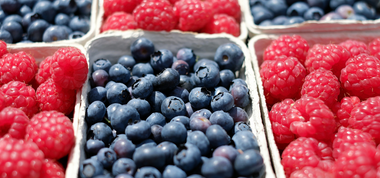The lowdown on sugar and all things sweet

Unless you’ve been on a remote island with no cell reception, you’ve heard the news that a World Health Organization committee determined that aspartame, the artificial ingredient that sweetens diet soda, gum, yogurt and more, is “possibly carcinogenic to humans.” The US Food and Drug Administration insists that it’s safe.
Here’s my take: Whether or not aspartame is linked to cancer, it’s simply not good for you. In fact, there is very little reason to consume products with too much of any type of added sweetener, regardless of whether it ups the calories or not.
That’s because food products that are made with added sweeteners (real or fake) all have the same effect on the body, and that’s to raise insulin levels. And insulin is a problem because, as a hormone that drives blood sugar storage, it prompts our bodies to go into storage mode in general. And what’s the storage form of cholesterol? LDL — the unhealthy kind. So higher circulating insulin means higher LDL levels.
Easy to see why eating foods sweetened with a bunch of added sugar could raise insulin – it’s a direct effect. But why would a “fake” sweeter raise insulin? By an indirect effect related to the gut microbiome. Non-nutritive sweeteners like aspartame blunt the ability of our gut microbiome to make GLP1. GLP1 not only curbs appetite, it also enhances insulin sensitivity – so when GLP1 levels fall, the body needs to pump out much more insulin in response to any meal. No wonder people who drink diet soda develop type 2 diabetes at the same rate as regular soda consumers.
Bottom line – sweeteners of all kinds should be limited in our diet.
But that does NOT mean that all sugar is bad! The sugar you never have to worry about is the sugar that’s intrinsically present in whole fruits and vegetables. Once again, nature is brilliant and no food company has been able to out-package it. A piece of fruit, like an orange for example, contains just the right amount of fiber in the form of pith and pulp to slow down digestion, reducing the stimulus for insulin production. But watch out - as soon as you start tinkering with that orange - even by just squeezing the juice out – those intrinsic counter-balancing benefits disappear.
As you might guess, consuming whole fruit is the most ideal way to satisfy your sweet tooth. However, since that’s probably not going to happen 100 percent of the time, dietary guidelines allow at least a small amount of added sugar. The WHO advises that adults eat no more than 10 teaspoons (40 grams) of added sugar per day. To put that in perspective, a “fruit on the bottom” yogurt cup will probably get you halfway there. Meanwhile, eating two whole oranges, a bowl of pineapple chunks and a cup of dates still leaves those 40 grams untouched.
All of these subtleties around sweeteners and how they affect our metabolism can make interpreting a Nutrition Facts Panel (NFP) really confusing. People often focus on the sugar content of an item, but total sugar content tells you nothing about where the sugar comes from! And a low sugar item is not necessarily healthy if it contains a bunch of non-nutritive sweeteners. The net effect is that, though originally intended to educate consumers, NFPs – and even Ingredient Lists -- have become just another opportunity for food companies to knowingly manipulate the facts.
Barley malt, cane juice crystals, crystalline fructose, galactose, malt powder, carob syrup, golden syrup, high-fructose corn syrup, honey, agave nectar, malt syrup, maple syrup, oat syrup, rice bran syrup, and brown rice syrup are often seen on Ingredient Lists and are all forms of added sugar. Luckily, the total contribution of these sweeteners will appear in grams as “added sugars,” in a separate line item on every NFP. Unfortunately, non-nutritive sweeteners don’t get their own itemization line… so beware of packages that claim “no added sugar” -- but still contain, among others, aspartame, saccharin, or sucralose.
And if that wasn’t enough to worry about, sugar alcohols (like xylitol, erythritol and isomalt) are not counted as sugar, so they’re not reflected in the added sugars line even though they are sugar-like substances that are ADDED during production to boost sweetness, and even though they contribute to calorie content and disturb metabolism.
Is it any wonder people can misinterpret an NFP or inadvertently gloss over important landmines in an Ingredient List? Or look at the NFP of Step One products and conclude they contain too much sugar?? Now I know those folks are wrong, but I can also understand how they got there. After all, if you or I were presented with just the total sugar content of one apple and of one Snickers Bar, we wouldn’t be able to tell which is which.
Food is far more complex than what standardized information panels on a box can convey.
Which is why, at Step One Foods, we’re not about just trying to make our NFPs look good. We know that the NFP is only a general indication of the macronutrient composition of the product inside the box - and we refuse to play games with that information. Instead, we’ve gone above and beyond and objectively demonstrated that the foods we make measurably improve health. Because that’s what counts.
So what do I do about sugar content when I look at an NFP? I ignore the sugar line! Instead, I look at the ingredient list and put the item back if I see a bunch of individually listed sugars and/or syrups. And I’m doubly suspicious – and even less likely to buy it - if a product specifically calls out its lack of added sugar.

Tested & Proven Results.
- Cardiologist formulated
- Supported by over 500 publications
- Clinically-proven, in a double-blind randomized trial with Mayo Clinic and The University of Manitoba
80% of participants lowered their cholesterol in just 30 days. With just two servings per day, Step One Foods offers a proven-effective way to naturally lower LDL (bad) cholesterol.
Get heart health tips and articles like this, delivered right to your email.
New articles every week.
You may also like...

Spring Into Heart Health: The Best Seasonal Foods to Eat Now

You don’t need to avoid foods with cholesterol…except for these



